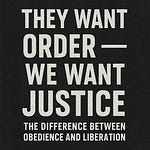Overview:
This episode reframes empathy not as soft sentimentality, but as radical defiance. In systems built on domination, punishment, and hierarchy, empathy threatens the entire structure. It humanizes those marked as “other,” challenges propaganda, and refuses to reduce people to their utility or conformity.
To feel with others — especially those the system tells you to fear or hate — is an act of rebellion.
In This Episode:
Why authoritarian systems fear empathy
How dehumanization preserves power
What happens when we allow ourselves to care across lines of division
The cost — and the power — of refusing to look away
Why empathy is both emotionally exhausting and urgently necessary
Key Concepts Covered:
Empathy as a refusal to participate in harm
The moral danger of emotional detachment
How propaganda works to numb or redirect compassion
Empathy as fuel for justice, not a substitute for it
Featured Frameworks:
12 Utilities: Empathy restores dignity, care, voice, and recognition
PERMAH: Empathy unlocks meaning, connection, and positive emotion — the core of flourishing
Prospect Theory: Systems teach people to fear losing comfort more than others’ suffering
Admiration Equation: Those who act with courage, kindness, and compassion—even under threat—become moral leaders
Memorable Quote:
“To feel what they feel is to see what power wants you to ignore. That’s why empathy is dangerous.”
Reflection Prompt:
Where have you been told it’s weak to care?
What truth do you see more clearly because you refused to look away?













Share this post